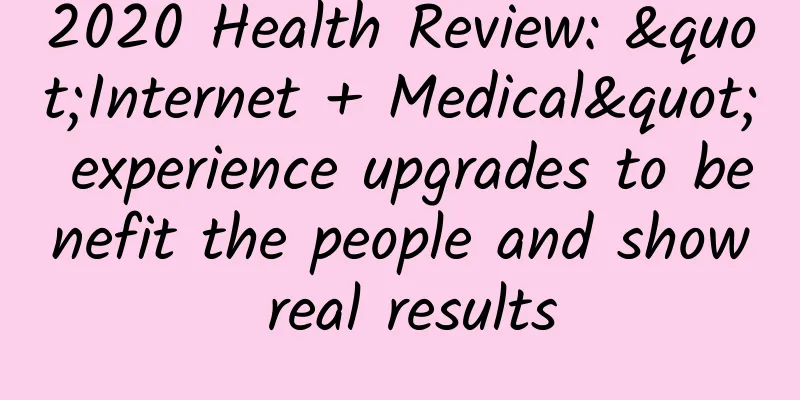2020 Health Review: "Internet + Medical" experience upgrades to benefit the people and show real results

|
"It took less than 24 hours from the start of the online consultation to the receipt of the medicine, which brought great convenience to me and the elderly around me." This was the personal experience of "Internet + Medical Care" by a 70-year-old man during this year's COVID-19 epidemic. In 2020, under the special background of the COVID-19 epidemic, the demand for Internet diagnosis and treatment has exploded. The National Health Commission and the National Healthcare Security Administration have successively issued a number of documents, emphasizing the need to give full play to the role of Internet diagnosis and treatment consulting services in epidemic prevention and control, and to promote the vigorous development of domestic "Internet + medical" services. This year, patients can receive follow-up visits and consultations online through Internet hospitals, and even have their medicines delivered to their homes. In many places, they can also settle medical insurance bills. More and more people have accepted the "cloud medical" model of seeing a doctor. The supply of online medical services has continued to grow, and the quality has continued to improve. Opening up a "second battlefield" to help fight the epidemic online On January 25, the first day of the Lunar New Year, Ms. Dong, who had been troubled by symptoms such as "sore throat, sneezing, coughing up yellow phlegm, and runny nose" for many days, received an expert diagnosis without leaving her home. She sought help from the online consultation service clinic for "pneumonia caused by the new coronavirus" at the Henan Provincial People's Hospital. According to the hospital's data, on January 24, 24 patients consulted the platform within less than a day after it went online. As of November, the number of online consultations reached 38,300, effectively alleviating the pressure on offline fever clinics. "During the epidemic, more than 40,000 medical staff rushed to Hubei. More doctors took advantage of information technology to open up a 'second battlefield' online, breaking through the bottleneck of medical service supply and providing strong support to the main battlefield in Hubei." At a video seminar jointly held by the World Health Organization's Western Pacific and Southeast Asia Regional Offices and the Asian Development Bank, Mao Qunan, Director of the Planning Department of the National Health Commission, gave an example. In the process of Guangdong's support for Jingzhou's medical team and Jingzhou City to build an Internet hospital, 15 medical institutions and more than 1,300 doctors in Guangdong volunteered to participate. The Internet hospital went online for 18 days and the total number of visits exceeded 100,000. It can be said that a "medical team that cannot be taken away" was left for the local area. In Zhejiang, the Internet hospital platform provides continuous and progressive online medical and health services to the public through functional modules such as "information release and health education", "online intelligent consultation and manual service" and "Internet hospital new pneumonia channel". In Tianjin, the city launched an online free clinic campaign in Internet hospitals, encouraging doctors across the city to use their spare time to provide unlimited and free health consultation services to the public. In Shanghai, Hunan and other places, the first batch of Internet hospitals were opened at an "accelerated" rate... During the epidemic, medical and health institutions at all levels made full use of "Internet +" methods, innovated service models, optimized service efficiency, and served as the "gatekeepers" of people's health. "Under the sudden outbreak, the contactless advantages of the Internet have been brought into full play. Internet consultation and Internet diagnosis and treatment have become new businesses that have exploded during the epidemic." Lu Qingjun, director of the Hospital Development Office of the China-Japan Friendship Hospital and director of the National Telemedicine and Internet Medicine Center, analyzed that chronic disease patients have received electronic prescriptions and continued treatment with home delivery of medicines through the Internet. Residents have a new experience and new understanding of "Internet + medical care", which has reduced the chances of gathering in hospitals during the epidemic, weakened the fear of the epidemic, and obtained continuous treatment of long-term medication. The local benefits to the people are recognized and accelerated application to release dividends On the afternoon of June 15, Aunt Lu, who lives in Shijingshan District, Beijing, has a history of thyroid dysfunction for many years and has been taking oral medication for a long time. She found Dong Song, the director of the endocrinology department who had treated her, through the "Aerospace Medical Communication" Internet diagnosis and treatment service platform of the Aerospace Center Hospital. Dong Song conducted a follow-up consultation with Aunt Lu via video and completed the online prescription. Aunt Lu received the medicine delivered to her door by express delivery that afternoon. She was very satisfied with the non-contact medical treatment method during the epidemic. "Aviation Medical Communication" online diagnosis and treatment for doctor-patient interaction (Photo provided by Aerospace Center Hospital) Mr. He's child suffers from Kawasaki disease and was hospitalized in the Department of Cardiovascular Medicine of the Children's Hospital Affiliated to Capital Institute of Pediatrics (hereinafter referred to as "CIPP"). After discharge, he had to continue taking medication for more than 3 months and return to the hospital for regular checkups. Seeing that the medicine was almost "running out" but he had not made an appointment, Mr. He was extremely anxious. Later, at the reminder of the initial examination nurse, he made an appointment for the "remote video follow-up" number of the Department of Cardiovascular Medicine through the "Beijing Medical Communication" platform that afternoon, and successfully completed the follow-up visit and medication. "Through Internet diagnosis and treatment, follow-up visits and medication can be achieved, saving patients from other provinces and cities from the trouble of traveling." Cong Xiaohui, deputy chief physician of the Department of Cardiovascular Medicine of CIPP, said. "Cloud Clinic" of the Children's Hospital Affiliated to Capital Institute of Pediatrics (Photo provided by Capital Institute of Pediatrics) "Professor Zhang, can my surgery be postponed for two months?" "I found a lung nodule during my previous physical examination, and this year I have another nodule. Can you please help me take a look?" On March 26, at the remote consultation center of Zhengzhou People's Hospital, Professor Zhang Guozhen's team from Huadong Hospital affiliated to Fudan University worked with the thoracic surgery team and medical imaging team of Zhengzhou People's Hospital headquarters to answer patients' questions. "All my questions have been answered, and I feel relieved," said a patient who participated in the remote consultation. Experts at the remote consultation center of Zhengzhou People's Hospital answer questions for patients (Photo courtesy of Zhengzhou People's Hospital) In order to better meet the medical needs of the people and make the Internet smart health service "at your fingertips", the Internet smart health service center of Henan Provincial People's Hospital was launched on May 12. As of November, the cloud clinic of the service center had a total of 51,694 consultations and 137,302 registrations. Data from the National Health Commission shows that as of now, China already has 900 Internet hospitals, and the telemedicine collaboration network covers more than 24,000 medical institutions in all prefecture-level cities, and more than 5,500 second-level and above hospitals can provide online services. Lu Qingjun believes that 2020 is a milestone for "Internet + Healthcare" to shift from the exploration stage to the application and promotion stage. At the "2020 Smart Healthcare Development Forum" hosted by People's Daily Online and People's Health on October 30, Mao Qunan said: "The policy effect of the development of 'Internet + Healthcare' is becoming increasingly apparent. In the next step, the National Health Commission will further leverage the advantages of 'Internet +', consolidate the foundation, improve the mechanism, deepen the application, and further promote 'Internet + Healthcare' to benefit the people and improve the satisfaction of the general public in receiving medical and health services." "Breaking the Ice" in Medical Insurance: Online Medical Treatment Can Be Reimbursed In 2020, the National Health Insurance Administration successively issued the "Guiding Opinions on Promoting the Development of "Internet +" Health Insurance Services during the Prevention and Control of the New Coronavirus Pneumonia Epidemic" and the "Guiding Opinions on Actively Promoting the Medical Insurance Payment of "Internet +" Medical Services", guiding local medical insurance departments to solve problems and difficulties and comprehensively standardize the "Internet +" medical insurance service work. In particular, it clarified a number of people's livelihood dividend policies such as "localities will gradually expand the scope of medical insurance payments for common diseases and chronic diseases'Internet +' medical services", accelerating the promotion of "Internet +" medical insurance payments into the practical level. On October 26, the Beijing Institute of Pediatrics passed the "Internet +" medical insurance qualification review and became the first pediatric hospital in Beijing to settle medical service fees in real time and settle offline medical insurance for drugs and tests. When Ms. Wang, who lives in Chaoyang District, took her child to the "cloud" for medical treatment, she was pleasantly surprised to find that the registration fee could be reimbursed by medical insurance, and the 40 yuan medical insurance fee was directly refunded. Now, the "cloud clinics" of some hospitals in Beijing can realize real-time medical insurance settlement. "Cloud Clinic" realizes real-time medical insurance settlement (Photo provided by Capital Institute of Pediatrics) On October 29, Jiangsu Nantong Medical Insurance APP added the "Emergency Medicine Delivery" function. Users only need to log in to the APP, select "Emergency Medicine Delivery", the store and the medicine they need, and pay with one click. They can wait for the medicine to be delivered to their door without leaving home. During the COVID-19 epidemic, Wuhan City issued the "Wuhan Internet + Medical Insurance Service Implementation Plan", carried out Internet diagnosis and treatment in many hospitals, implemented online medical insurance payments at designated pharmacies for chronic disease outpatient clinics, and delivered offline medicines to patients' homes, making it convenient for patients to purchase medicines. In addition, some hospitals in Jiangsu, Shanghai and other places have also realized medical insurance settlement, medical insurance patients can pay online without card, and medicines can be delivered to their homes, realizing home consultation and door-to-door medicine delivery services. As of the end of June this year, 12 medical institutions in Shanghai have realized online real-time settlement of medical insurance, with more than 17,800 people settled and a total cost of 2.5982 million yuan. "Innovative payment methods for medical insurance provide strong guarantees for the rapid development of 'Internet + Healthcare'." Lu Qingjun concluded that 2020 was an extraordinary year. The epidemic brought suffering but also hope. After the early exploration and practice of "Internet + Healthcare", the new production relationship of access and supervision has been clarified at the national level, and medical institutions and industrial institutions have clarified the direction of development. "Internet + Healthcare" has entered a new stage of vigorous and standardized development. Dong Jiahong, an academician of the Chinese Academy of Engineering and chairman of the Smart Healthcare Committee of the Chinese Medical Doctor Association, also said at the "2020 Smart Healthcare Development Forum" that "Healthy China" proposes to shift the focus of medical and health care from "disease treatment" to "health", and strive to build a health care service system covering all dimensions and the whole life. Digital healthcare can play an important role in each link. Standing at a new starting point and based on a new stage of development, we believe that the medical and health care industry that integrates and innovates "Internet +" will improve quality and efficiency in promoting tiered diagnosis and treatment, promoting the homogenization of medical resources, improving the existing stock of primary medical services, increasing the growth of the health industry, ensuring fair and accessible basic medical care, and comprehensively promoting the construction of a healthy China, helping to take people's health and lives to a new level. |
>>: What causes lettuce to turn red? Lettuce growing conditions
Recommend
I had a miscarriage one month into my pregnancy. Do I need a uterine curettage?
Many people cannot tell the difference between sp...
How many days does a girl's menstrual period last?
The number of days a girl's menstrual period ...
The least harmful method of abortion
Abortion is a method of terminating pregnancy tha...
What is "i人e人"? Can MBTI really define us?
I don’t know when it started, but MBTI is everywh...
How long does it take to go to the toilet frequently during pregnancy?
Most women are quite excited when they are pregna...
Six behaviors of women that are most damaging to breasts
Breasts are very important organs for women and a...
How long after drinking can you get pregnant
Many young women like to drink, and some women ca...
[Medical Q&A] Do you know that there is a type of stroke called "venous stroke"?
Author: Gu Yaqin Xuanwu Hospital, Capital Medical...
As the Year of the Ox approaches, are those enduring health-preserving methods in life secrets or misunderstandings?
Niu Niu: The New Year is prosperous, let’s make s...
Will the amniotic fluid leak a little bit?
In the late stages of pregnancy, pregnant women n...
How long after the curettage can I have sex?
Diagnostic curettage is also called curettage. It...
Is it retching or vomiting during pregnancy?
For many people, the first impression of pregnanc...
Yellow leucorrhea in early pregnancy
Women's secretions can generally reflect whet...









